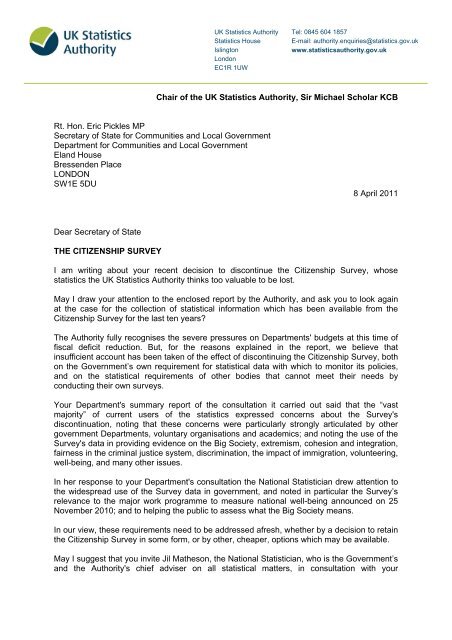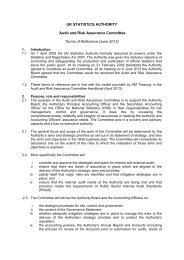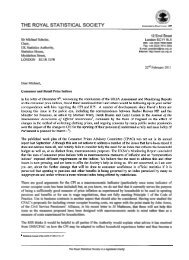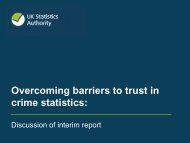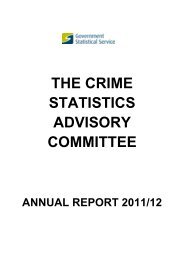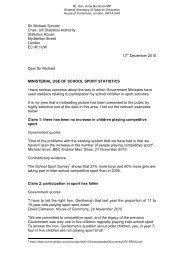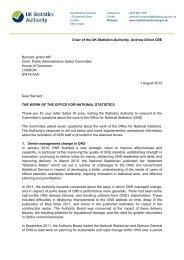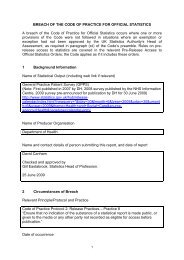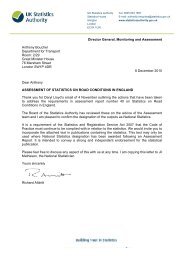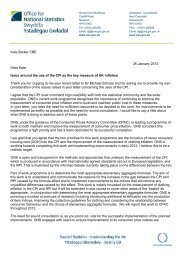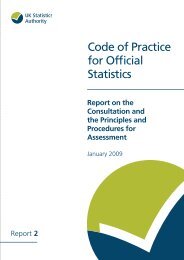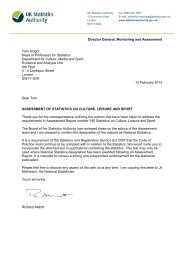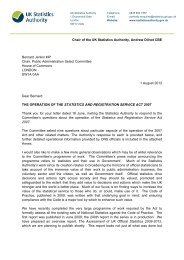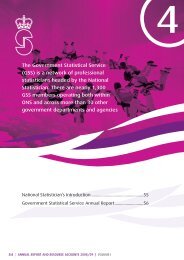Letter from Sir Michael Scholar to Rt Hon Eric Pickles MP 8 April ...
Letter from Sir Michael Scholar to Rt Hon Eric Pickles MP 8 April ...
Letter from Sir Michael Scholar to Rt Hon Eric Pickles MP 8 April ...
You also want an ePaper? Increase the reach of your titles
YUMPU automatically turns print PDFs into web optimized ePapers that Google loves.
UK Statistics AuthorityStatistics HouseIsling<strong>to</strong>nLondonEC1R 1UWTel: 0845 604 1857E-mail: authority.enquiries@statistics.gov.ukwww.statisticsauthority.gov.ukChair of the UK Statistics Authority, <strong>Sir</strong> <strong>Michael</strong> <strong>Scholar</strong> KCB<strong>Rt</strong>. <strong>Hon</strong>. <strong>Eric</strong> <strong>Pickles</strong> <strong>MP</strong>Secretary of State for Communities and Local GovernmentDepartment for Communities and Local GovernmentEland HouseBressenden PlaceLONDONSW1E 5DU8 <strong>April</strong> 2011Dear Secretary of StateTHE CITIZENSHIP SURVEYI am writing about your recent decision <strong>to</strong> discontinue the Citizenship Survey, whosestatistics the UK Statistics Authority thinks <strong>to</strong>o valuable <strong>to</strong> be lost.May I draw your attention <strong>to</strong> the enclosed report by the Authority, and ask you <strong>to</strong> look againat the case for the collection of statistical information which has been available <strong>from</strong> theCitizenship Survey for the last ten years?The Authority fully recognises the severe pressures on Departments' budgets at this time offiscal deficit reduction. But, for the reasons explained in the report, we believe thatinsufficient account has been taken of the effect of discontinuing the Citizenship Survey, bothon the Government’s own requirement for statistical data with which <strong>to</strong> moni<strong>to</strong>r its policies,and on the statistical requirements of other bodies that cannot meet their needs byconducting their own surveys.Your Department's summary report of the consultation it carried out said that the “vastmajority” of current users of the statistics expressed concerns about the Survey'sdiscontinuation, noting that these concerns were particularly strongly articulated by othergovernment Departments, voluntary organisations and academics; and noting the use of theSurvey's data in providing evidence on the Big Society, extremism, cohesion and integration,fairness in the criminal justice system, discrimination, the impact of immigration, volunteering,well-being, and many other issues.In her response <strong>to</strong> your Department's consultation the National Statistician drew attention <strong>to</strong>the widespread use of the Survey data in government, and noted in particular the Survey’srelevance <strong>to</strong> the major work programme <strong>to</strong> measure national well-being announced on 25November 2010; and <strong>to</strong> helping the public <strong>to</strong> assess what the Big Society means.In our view, these requirements need <strong>to</strong> be addressed afresh, whether by a decision <strong>to</strong> retainthe Citizenship Survey in some form, or by other, cheaper, options which may be available.May I suggest that you invite Jil Matheson, the National Statistician, who is the Government’sand the Authority's chief adviser on all statistical matters, in consultation with your
Department's own statisticians, <strong>to</strong> advise you on the most effective and cost efficient way ofmeeting the statistical requirements which your consultation revealed?The Authority’s report on the Citizenship Survey will be published on our website. TheAuthority is also producing a report on the cancellation of the Place Survey and I will write <strong>to</strong>you again when that report is complete.I am copying this letter <strong>to</strong> the Minister for the Cabinet Office and <strong>to</strong> Jil Matheson.Yours sincerely<strong>Sir</strong> <strong>Michael</strong> <strong>Scholar</strong> KCB
UK STATISTICS AUTHORITYStatistical Expenditure Report 1: The Citizenship SurveyStatistical Expenditure Reports review substantive cuts and changes<strong>to</strong> UK official statistics. This report has been prepared and issuedindependently by the UK Statistics Authority.The Citizenship Survey was first conducted in 2001. It was originally biennial but moved <strong>to</strong> acontinuous design in 2007, allowing data <strong>to</strong> be published on a quarterly basis <strong>from</strong> <strong>April</strong> 2007.The Survey was first carried out by the Home Office but transferred <strong>to</strong> the Department forCommunities and Local Government (DCLG) <strong>from</strong> 2005, <strong>from</strong> which point its coverage wasrestricted <strong>to</strong> England only.The Survey seeks the views of the public on a number of <strong>to</strong>pics relating <strong>to</strong> local areas includingcommunity cohesion; racial and religious prejudice and discrimination; identity; values;interaction and mixing; attitudes <strong>to</strong> violent extremism; civic engagement; volunteering andcharitable giving. The Department acknowledges that the Survey results are used for purposesincluding:…moni<strong>to</strong>ring the impact of policies and events such as the Olympics, public accountability,exploring the impacts of the recession, developing and evaluating strategies, planning services,responding <strong>to</strong> enquiries <strong>from</strong> <strong>MP</strong>s, as evidence for funding, targeting polices, …equality impactassessments…and…understanding the complex interplay between various social attitudes anddemographic characteristics. 1In 2009-10 the Survey had a budget of approximately £3.6 million. The Survey is estimated <strong>to</strong>account for just under one-third of DCLG’s statistical expenditure 2 .The Survey fieldwork is contracted <strong>to</strong> private sec<strong>to</strong>r survey companies. The results are includedwithin the scope of National Statistics 3 , and were due <strong>to</strong> have been formally assessed by theAuthority for compliance with the Code of Practice for Official Statistics in December 2010.However, because of uncertainties about the future of the Survey, this planned assessment wasdeferred.At the end of November 2010, DCLG completed a public consultation on the Survey. Thispresented a number of options including, as the preferred option, ceasing the Survey1 Taken <strong>from</strong> DCLG’s summary of responses <strong>to</strong> its consultation:http://www.communities.gov.uk/publications/communities/csconsultresponses2 DCLG does not have a central dedicated budget for statistical work because much of that work is carried out in anumber of different Policy Direc<strong>to</strong>rates.3 National Statistics are defined under the provisions of the Statistics and Registration Service Act 2007 whichrequires that they be produced and published in accordance with the Code of Practice for Official Statistics.
completely. On 25 January 2011, the Department announced that the Citizenship Survey was <strong>to</strong>be cancelled at the end of March 2011 4 . The summary of consultation responses was notpublished until 17 March 2011, notwithstanding the requirement of the Government Code ofPractice on Consultation, that the results of the consultation should be published before oralongside any further action. This summary was accompanied by a further statement confirmingthat the Citizenship Survey was <strong>to</strong> be cancelled. It said:As part of the current drive <strong>to</strong> deliver cost savings across government and <strong>to</strong> reduce the fiscaldeficit, research budgets are being closely scrutinised <strong>to</strong> identify where savings can be made. Forthis reason, and the belief that priority data <strong>from</strong> this survey can either be dropped; collected lessfrequently; or collected via other means, the intention is for future Citizenship Surveys <strong>to</strong> becancelled. 5The UK Statistics Authority has reviewed the 61 individual responses 6exercise and DCLG’s own summary 7 , and notes the following:<strong>to</strong> the consultationThe response <strong>from</strong> the National Statistician drew attention <strong>to</strong> the widespread use of theSurvey data in government and noted in particular the Survey’s relevance <strong>to</strong>: the majorwork programme <strong>to</strong> measure national well-being announced on 25 November 2010;helping the public <strong>to</strong> assess what the Big Society means and how things are changing;and <strong>to</strong> the production of indica<strong>to</strong>rs in the Equality Measurement Framework. 8The response <strong>from</strong> the House of Commons Library noted the use of the Survey data inresponding <strong>to</strong> <strong>MP</strong>’s enquiries on numbers of people volunteering, civic participation,community cohesion, and the voluntary sec<strong>to</strong>r more generally, and pointed <strong>to</strong> theSurvey’s relevance <strong>to</strong> two of the three main strands of the Big Society programme. DCLG’s own summary of responses contains the following statement: “…the vastmajority of current users expressed concerns about its discontinuation. This view wasparticularly strongly articulated by other government departments, voluntaryorganisations and academics.” It also noted the use of the Survey data in providingevidence on the Big Society; cohesion and integration; extremism; equalities; localism;fairness in the criminal justice system; the impact of immigration; identity; discrimination;understanding neighbourhoods and communities, and well-being. In respect of several ofthese headings it gives more detail on the use made of the results.In response <strong>to</strong> these points, the summary comments: “The Department is moving away<strong>from</strong> costly <strong>to</strong>p-down moni<strong>to</strong>ring and measurement of policies and does not believe thatthe costs of the survey can be justified for these purposes.” It adds that it would “expec<strong>to</strong>ther providers who have a priority need for data of this type <strong>to</strong> take steps <strong>to</strong> provide itthemselves, in the academic or external market”.4 http://www.communities.gov.uk/communities/research/citizenshipsurvey/surveycancellation/5 http://www.communities.gov.uk/communities/research/citizenshipsurvey/surveycancellation/6 http://www.communities.gov.uk/documents/communities/pdf/1866643.pdf7 http://www.communities.gov.uk/documents/communities/pdf/1866399.pdf8 http://www.equalityhumanrights.com/key-projects/equality-measurement-framework/
ANNEX – FURTHER DETAILSThe Survey has a core sample of 10,000 adults and an ethnic minority boost of about 5,000(and, in the latest year, a Muslim boost sample of 1,200). Data are collected through face-<strong>to</strong>faceinterviews lasting some 60 minutes.Between 2007 and 2011 DCLG published a quarterly statistical release 9 , presenting mainresults and tables, some diagrams, and commentary. The majority of the information related <strong>to</strong>England only. DCLG also published some <strong>to</strong>pic reports, such as on volunteering and oncommunity cohesion. The data are available via the UK Data Archive 10 .The decision making processWe were <strong>to</strong>ld that, because of the profile of the Survey, its expense, and the procurementimplications, it was considered appropriate within DCLG that Ministers should make the finaldecision about the future of the Survey, rather than the Head of Profession for Statistics.A four-week 11 consultation was launched on 1 November 2010 on the uses of the Survey, theimplications of s<strong>to</strong>pping the Survey, and possible other data sources should the Survey becancelled. The starting point for the consultation was that the Survey would be cancelled afterthe 2010-11 Survey unless "users indicate an overriding need <strong>to</strong> continue".The consultation document was published on DCLG’s website and was “targeted on users andstakeholders". DCLG <strong>to</strong>ld us that all known users of the Survey were notified of the consultationby e-mail and were also sent reminders before the deadline for responses expired. Our ownresearch confirmed that a number of websites that had published information about theconsultation. The consultation document said that “a summary of the consultation responseswill be published on the Department’s website”. DCLG <strong>to</strong>ld us that an assessment of the impac<strong>to</strong>n a) users and b) other statistical work in government would be part of the published response<strong>to</strong> the consultation. This summary of consultation responses was not published until 17 March2011 12 .Uses of the statisticsDCLG itself has used the Survey results <strong>to</strong> moni<strong>to</strong>r progress against targets relating <strong>to</strong>community cohesion. The Survey results are also used elsewhere in government, by theMinistry of Justice, Home Office, Department for Work and Pensions, Cabinet Office, Office forCivil Society, and the Government Equalities Office among others.9 http://www.communities.gov.uk/communities/research/citizenshipsurvey/quaterlystatisticalreleases/10 http://www.data-archive.ac.uk/11 DCLG statisticians <strong>to</strong>ld us that because this was a technical consultation they did not run the consultation for themore normal 12 week duration.12 The Government’s Code of Practice on Consultation says: “Following a consultation exercise, the Governmentshould provide a summary of who responded <strong>to</strong> the consultation exercise and a summary of the views expressed <strong>to</strong>each question. A summary of any other significant comments should also be provided. This feedback should normallyset out what decisions have been taken in light of what was learnt <strong>from</strong> the consultation exercise. This informationshould normally be published before or alongside any further action.”
The results are, and would have continued <strong>to</strong> be, valuable <strong>to</strong> work planned by the Office forNational Statistics on the measurement of national well-being, and of potential value in relation<strong>to</strong> ‘Big Society’ issues, as well as supporting the measurement of progress against indica<strong>to</strong>rs inthe Equality Measurement Framework.There are many non-government users, including academic researchers and organisations inthe third sec<strong>to</strong>r.Local authority use of the Survey was thought <strong>to</strong> be limited, because the Survey’s sample sizedid not support the production of robust local authority level estimates.A number of statistical time-series are available <strong>from</strong> the Survey including: Whether people feel able <strong>to</strong> influence decisions affecting their local area and Britain. Participation in civic engagement and voluntary activities. Participation in civic engagement and formal volunteering at least once in the lastyear, by ethnicity, religious affiliation, sex, age and disability. Whether people trust institutions. Community cohesion, by ethnicity, religious affiliation, Government Office Region,sex and age. Whether people feel that they belong strongly <strong>to</strong> their neighbourhood and Britain. Mixing with people <strong>from</strong> different ethnic or religious backgrounds by ethnicity,religious affiliation, age and sex (percentage mixing at least once a month). Satisfaction with local area. Whether the number of immigrants coming <strong>to</strong> Britain should be increased, reducedor remain the same. How worried are people about becoming the victim of crime. Whether people feel safe walking alone in their neighbourhood after dark. Whether racial or religious harassment is a problem in the local area, by ethnicity,religious affiliation, sex and age. Perceptions of racial and religious prejudice <strong>to</strong>day compared with five years ago, byethnicity. Whether people feel they would be treated worse than people of other races bypublic service organisations, by ethnicity.Effect on statistical capacity in governmentThe DCLG Head of Profession has <strong>to</strong>ld us that it is not currently clear whether thediscontinuation of the Citizenship Survey will lead directly <strong>to</strong> the loss of the professional staff.DCLG, along with other government departments, has recently undertaken a Structural Review.Amongst other things, this built on the outcome of an internal review of users’ future needs forthe current portfolio of DCLG statistics 13 . The Structural Review could lead <strong>to</strong> either theredeployment, or re-assignment, of the Department’s professional resources.13 The outcome of DCLG’s Statistics Review will be described in the Department’s forthcoming ‘Statistics Plan’. Thiswill be published on the Department’s website for public consultation.


